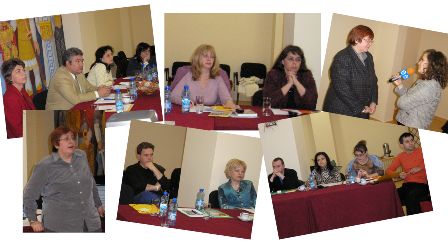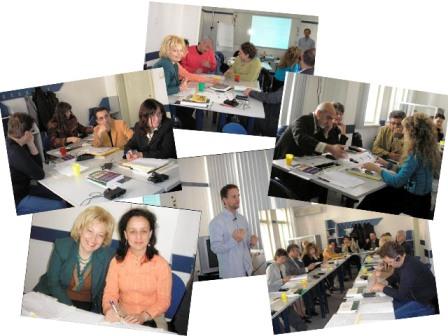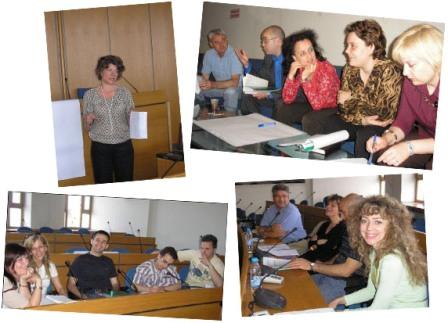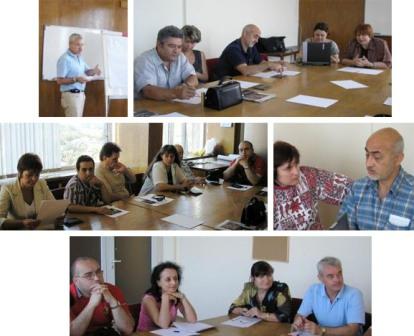Training
The main project activities are focused on raising the gender awareness and the capacity of municipalities to mainstream gender in their work by using the 3R method and gender budgeting. In Bulgaria, like in the other two partner countries, were trained municipal servants and councillors, who attended a series of 4 seminars, intended to introduce the gender equality policy in public life as well as to develop practical skills for applying the instruments of gender mainstreaming in the work of the municipality. Seminar 1: Veliko Turnovo, 30 March - 1 April 2007
 The training program included main concepts, related to gender equality (sex and gender, gender roles, stereotypes), the legal framework for equal treatment and non-discrimination in Bulgaria and EU, UN instruments; the institutional mechanism for gender equality as well as the main methods of gender mainstreaming. Another focus of the training fell on the gender aspects of the European policy for local development. During the training were discussed several main documents that represent the commitments of organizations of local authorities to gender equality - the European charter for equality of women and men in local life of the Council of European Municipalities and Regions (2006), which builds upon the Worldwide Declaration on "women in local government" (1998) of the International Union of Local Authorities; the Declaration on the fight against trafficking in human beings of the Congress of Local and Regional Authorities to the Council of Europe (2006), as well as examples for good practices - Swedish, Scottish, Canadian. It was emphasised that the National Association of Municipalities in the Republic of Bulgaria has established a Committee of women in local governance, which works for raising the awareness on gender issues and improving the representation of women in local governments. The first seminar was attended by 16 participants - 11 women and 5 men. Furthermore, a special training was organised for the councillors of Sofia Municipal Council with the same program in order to prepare them for the next seminars. The seminar took place on the 5 of April and was attended by 4 councillors - 3 women and 1 man. Seminar 2: Sofia, 20-21 April 2007
 The focus of the second seminar fell on the 3R method which was presented by the lecturer Fredrik Lundkvist, a gender expert from Sweden with extensive experience for the Swedish Association of Municipalities and Regions. It was attended by 17 participants of which 8 men. What is the 3R method? The 3R method was developed in Sweden to serve the purpose of gender mainstreaming, and which is used to make surveys of the situation of women and men in different spheres of life. It presents a possibility for examining whether municipal practices have in-built discriminatory practices. In this method, a quantitative investigation of the first two Rs, representation and resources, forms the basis of the third R, realia, which is more of a qualitative component. With the aid of a simple survey and analysis, it is possible to generate concrete local discussions on equality, based on the work actually being done. The logic behind the 3R method is that very often we make decisions or initiate activities that help to maintain inequality between women and men. This may be because our notions of women and men include stereotypes or are obsolete, or because we regard the administrative or political areas as gender neutral. This method has already been used in Nordic municipalities and has proven to be very efficient. It is also easily applicable in other countries due to its relative simplicity. The seminar gave knowledge and created practical skills in using the 3R method by helping the participants to select topics for their local 3R surveys and guiding their on-going work. The seminar further enhanced the gender sensitivity of the participants and their motivation to work on gender equality issues and helped the participants find rational arguments for mainstreaming gender in their work. |
The seminar presented the experience of Swedish municipalities in the field of gender equality. It gave knowledge and created practical skills in using the 3R method by helping the participants to select topics for their local 3R investigations and guiding their on-going work. The seminar further enhanced the gender sensitivity of the participants and their motivation to work on gender equality issues and helped the participants find rational arguments for mainstreaming gender in their work. More about good practices in the 3R method from Sweden:  VERKSTAN_eng_.pdf (739.33 Kb) VERKSTAN_eng_.pdf (739.33 Kb) With the help of the lecturer and the facilitators from the CWSP during the working sessions, the participants were divided in three major groups based on their choice of problems to investigate through their 3R surveys: the access to municipal/school sports facilities for women and men and girls and boys; the attitudes of male students (in foreign languages, pedagogy, psychology, social sciences, music and arts) to work with young children and their willingness to be interns at kindergartens; the attitudes of the citizens towards the acts of vandalism against the monuments of culture that may result in restricting the access to public spaces for women.
The participants were encouraged to keep in touch with the Center of Women's Studies and Policies and the expert Fredrick Lundkvist for further consultations on their surveys. More information on the results of the final surveys. Seminar 3: Sofia, 28-29 May 2007

The third seminar was dedicated to gender budgeting - concept, principles, aims and tools for gender budget analysis, as well as to the experience of Sweden and other Nordic countries in gender budgeting at national and municipal level. The lecturer Catharina Schmitz is Managing Director of the Institute of Public Management in Stockholm, and has provided consultancy for over ten years on gender and good governance and gender budgeting. She is currently working with integration of a gender perspective in the budgetary processes in the Nordic Countries for the Nordic Council of Ministers. Special emphasis was put on the arguments for integrating the gender equality perspective into the budgetary process. The participants were also involved in practical assignments in order to launch discussion and develop their skills. The seminar was attended by 17 people of which 8 men. Seminar 4: Plovdiv, 8 - 10 July 2007  The aim of the last seminar was to finalize the results of the 3R surveys conducted by the participants during the process of training. The participants presented their results and analyses. It was also discussed if any further data is needed to finalize the surveys or enhance them. The seminar was attended by 18 participants of which 8 men. More about the surveys: Media coverage The seminars in Veliko Turnovo, Sofia and Plovdiv were largely covered by local and national media. Before each event a press release was sent to the media in order to inform the public. During the first and the last seminars were organized press conferences as well as interviews for the local media. On the whole, all seminars and the project were well-reflected by the national media - daily newspaper „24 hours", the Bulgarian News Agency, the Information Agencies Focus and Actualno, Darik Radio, Military TV Channel, and a number of local media - three daily newspapers, five cable TV channels, two Municipal Cable Radios. During the last seminar in Plovdiv a major event of the National Association of Municipalities in the Republic of Bulgaria was held at the same time and this opportunity was used to spread information about the project among the participants in the National Meeting of Local Authorities, which was done with the kind cooperation of the Association.  | The project entitled "Equality for Local Development: Gender Mainstreaming in Municipalities" (2006-2007) is financed and implemented within the Community Programme relating to the Community Framework Strategy in Gender Equality (2001-2005). Sole responsibility for the contents of this publication lies with the authors, the Commission is not responsible for any use that may be made of the information contained there. |
The project is supported in part by a grant from Foundation Open Society Institute (Zug).

|



 Projects
Projects Projects 2007
Projects 2007 Project “Equality for local development: gender mainstreaming in municipalities”
Project “Equality for local development: gender mainstreaming in municipalities” 

 VERKSTAN_eng_.pdf
VERKSTAN_eng_.pdf



